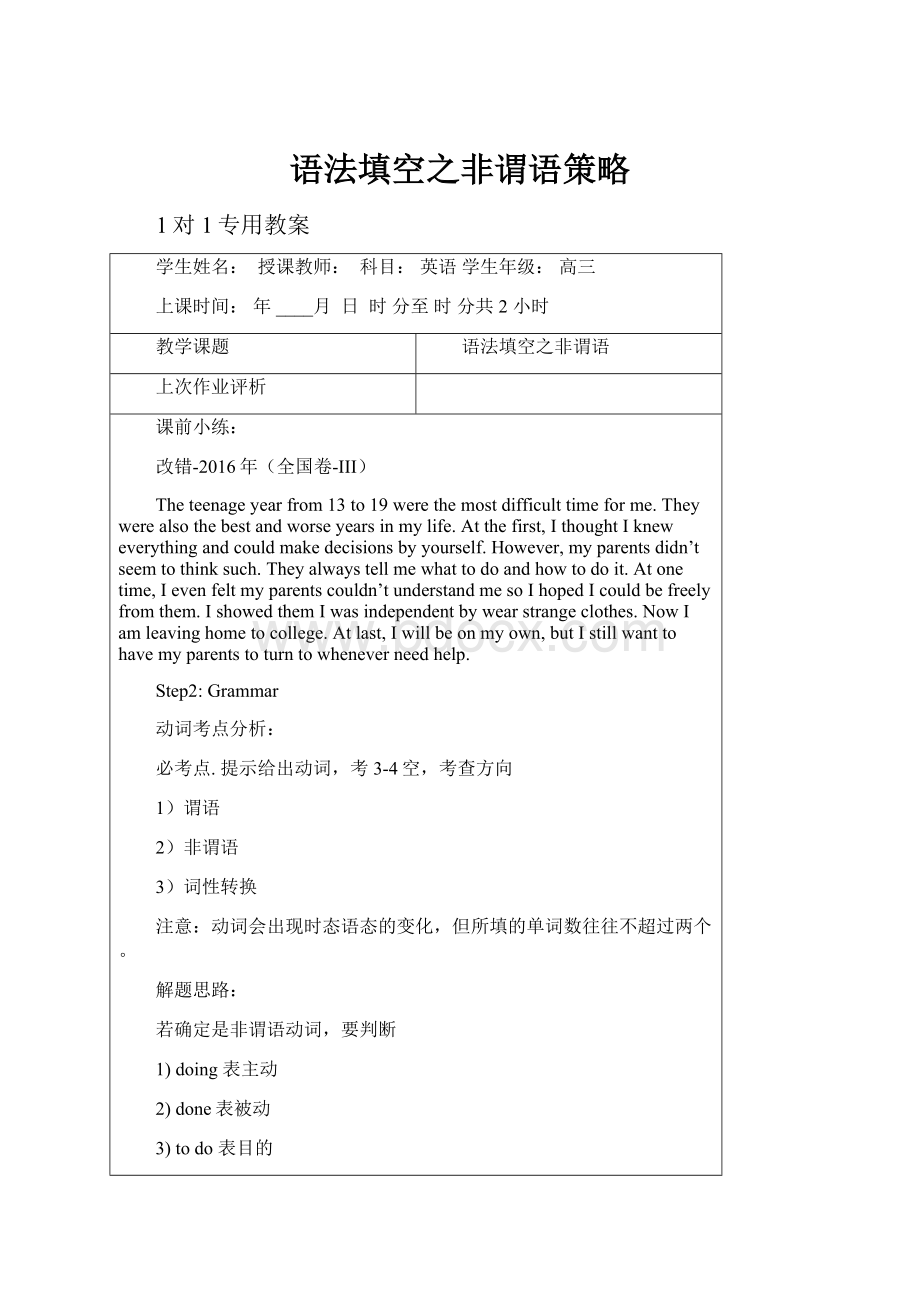语法填空之非谓语策略.docx
《语法填空之非谓语策略.docx》由会员分享,可在线阅读,更多相关《语法填空之非谓语策略.docx(15页珍藏版)》请在冰豆网上搜索。

语法填空之非谓语策略
1对1专用教案
学生姓名:
授课教师:
科目:
英语学生年级:
高三
上课时间:
年____月日时分至时分共2小时
教学课题
语法填空之非谓语
上次作业评析
课前小练:
改错-2016年(全国卷-III)
Theteenageyearfrom13to19werethemostdifficulttimeforme.Theywerealsothebestandworseyearsinmylife.Atthefirst,IthoughtIkneweverythingandcouldmakedecisionsbyyourself.However,myparentsdidn’tseemtothinksuch.Theyalwaystellmewhattodoandhowtodoit.Atonetime,Ievenfeltmyparentscouldn’tunderstandmesoIhopedIcouldbefreelyfromthem.IshowedthemIwasindependentbywearstrangeclothes.NowIamleavinghometocollege.Atlast,Iwillbeonmyown,butIstillwanttohavemyparentstoturntowheneverneedhelp.
Step2:
Grammar
动词考点分析:
必考点.提示给出动词,考3-4空,考查方向
1)谓语
2)非谓语
3)词性转换
注意:
动词会出现时态语态的变化,但所填的单词数往往不超过两个。
解题思路:
若确定是非谓语动词,要判断
1)doing表主动
2)done表被动
3)todo表目的
e.g.
Theadobedwellings(土坯房)1(build)bythePuebloIndiansoftheAmericanSouthwestareadmiredbyeven2mostmodernarchitectsandengineers.
方法:
一.非谓语动词:
当*定语*时,意为“……的”,横线位于n.后面。
(1)与被修饰的n.之间为主动关系时,用V.-ing;
(2)与被修饰的n.之间为被动关系时,用V.-ed(done).
二.非谓语动词:
当宾语时,横线位于vt.或prep.之后。
(1)位于prep.后,用V.-ing;
(2)位于vt.之后,根据vt.判断用V.-ing还是todo.
练习:
1.Thereismuchthatcanbedoneabouttheproblem__________(arise)fromawareness.
2.Mostoftheguests_________(invite)tothepartywerefamous.
3.Hetoldmesomethingaboutthefestivals_________(celebrate)inotherpartsoftheworld.
4.Theoldmanhasalargecollectionofrecords_________(date)backtothe1950s.
1.Ican’tafford__________(take)aholidaythissummerholidaybecauseoftheproject.
2.Hedetermined__________(return)homeearly.
3.Doyoufeellike__________(go)outforawalk?
4.Upon________(see)theoldpictures,Ican’thelp__________(think)ofmychildhood.
5.Idon’tmind__________(miss)thelastbus.
e.g.
Marywillneverforgetthefirsttimeshesawhim.Hesuddenlyappearedinclassoneday,1(wear)sunglasses.
三.非谓语动词:
当状语时,横线可位于句首、句中、句末或“,”之后:
(1)与句子主语之间为主动关系时,用V.-ing;
(2)与句子主语之间为被动关系时,用V.-ed(done);
练习
1.__________(be)busy,shedidn’treplytoherfather’sletter.
2._________(bear)intoapoorfamily,hehadonlytwoyearsofschooling.
3.__________(encourage)byhisteacher,hestillhasnoconfidenceinovercomingthedifficulties.
4.Hespititout,_________(say)itwasawful.【2010广东】
e.g.
Igotonthebusandfoundaseatneartheback,andthenInoticedaman2(sit)atthefront.
四.非谓语动词:
当宾补时,横线位于名词(宾语)之后:
(1)与名词(宾语)之间为主动关系时,用V.-ing;
(2)与名词(宾语)之间为被动关系时,用V.-ed(done);
练习
1.Icaughthim__________(read)myprivateletters.
2.Thecommanderkeptthesoldiers________(run)forhalfaday.
3.Ifoundmydinner________(prepare)themomentIarrivedhome.
4.Thedriverwasgoingtogetthetaxi__________(repair).
5.Thekidswatchedthestudents__________(play)basketballontheplayground.
五.非谓语动词todo的情形:
固定句式、固定搭配
如:
(1)Ittakes/took+时间+todo
adj.+enough+todo
(2)tell,ask,allow(允许),advise(建议),cause(导致),encourage(鼓励),beg(请求),urge(催促),get(使),force(迫使),drive(驱使),remind(提醒),order(命令),persuade(劝说)等动词的用法:
~+sb.+todo
e.g.
1.Whenanewdaybreaks,thewallshavegivenuptheirheatandarenowcoldenough6(cool)thehouseduringthehotday;7thesametime,theywarmupagainforthenight.(2015全国II卷)
2.Themotherurgedthelittleboy__________(go)bed.
3.Hewasencouraged__________(take)partinthecompetition.
代词考点分析:
代词:
常考点。
提示给出代词,最多考1空,考查:
人称代词、物主代词和反身代词之间的转换
e.g.
Afewhours2,I’dbeenathomeinHongKong,with3(it)chokingsmog.(2015年全国卷I)
方法:
1)横线后面有名词,变形容词性物主代词
练习:
1.Theboysittingtherecaught____(I)attention.
2.Ireallyappreciate____(you)timelyhelp.
3.Newtonwasthinkingaboutaproblemwhenanapplefellon____(he)head.
4.It'sapitythatshehasgivenup____(she)dream.
5.Thelittleboysaved____(it)life.
6.Wefinallyarrivedat____(we)destination.
7.Wewillarrangefor____(they)nextstepbasedontheactualsituation.
练习:
1.Nowitoccurredto10(he)thathisfarmhadmuchpotentialandthatthedeathofthecowwasabitofluck.
2.Thenhetook10(they)off,gaveabigsmileandsaid“Thatiscool”.
3.Greekpeopleoftenwearabluenecklacehopingtoprotect4(they)againstevils.
(2)横线后无名词,变宾格(me,him,her,us,them)
(3)若横线后无名词,且该代词与动作发出者一致时,变反身代词
名词:
必考点。
提示给出名词,考1-2空,考查方向:
(1)复数形式
(2)词性转换(变adj.)
方法:
1)若横线前面有形容词性物主代词、数词或形容词且后面无名词,该名词变复数形式
e.g.
I’dskippednearbyGuilin,adreamplacefortouristsseekingthelimestonemountaintopsanddarkwatersoftheLiRiver4arepicturedbyartistsinsomanyChinese5(painting).(2015年全国卷I)
2)若横线后面是名词,或横线后无名词但前有系动词时,该名词要变成形容词
如:
As9(nature)architects,thePuebloIndiansfiguredoutexactly10thicktheadobewallsneededtobetomakethecycleworkonmostdays.(2015年全国卷II)
Justbe10(patience).(2014年全国卷I)
系动词即:
“是”三“保”五“变”五“起来”☆
be(am/are/is/was/were);
keep/stay/remain;
become/get/turn/grow/go;
look/sound/feel/smell/taste
练习
1.Heskippedthedull_______(part)ofthebook.
2.Heisa_______(luck)dog.
3.Ireallyappreciateyour________(time)help.
4.Wearesearchingnew________(way)toexpandourmembership.
5.The_______(study),ledbyProfessorKing,havebeenappliedtomanyareas.
6.TheMid-AutumnFestivalisoneofthemost_________(tradition)Chinesefestivals.
7.Thisisoneofthemostwonderful________(match)Ihaveeverwatched.
8.Themanhasseveral__________(danger)experiences.
9.Theyareboth________(care)drivers.
10.Youneedtobe________(patience).
n.→adj.常见后缀
-yeg.:
luck-luckyhealth-healthynoise-noisy
-lyeg.:
friend-friendlylove-lovelymonth-monthly
-aleg.:
nation-nationalcentre-centralform-formal
-ouseg.:
humor-humorousfame-famous
-fuleg.:
use-usefulhelp-helpfulharm-harmful
-ce变-teg.:
patience-patientdistance-distant
convenience-convenientviolence-violent
形容词
形容词:
必考点。
提示给出形容词,考1-2空,考查方向:
(1)变副词(加-ly)
(2)变比较级或最高级
变副词的情形:
a)横线前或后有动词
b)横线后有形容词或副词
c)横线位于句首且后面有“,”
如:
(1)Theriverwassopollutedthatit2(actual)caughtfireandburned.(2014年全国卷I)
(2)Fiveothersonthebusbegantalkingaboutwhattheboyhaddoneandthecrowdofstrangers10(sudden)becamefriendlytooneanother.(2014年全国卷II)
(3)Hemustbe5(mental)disabled.
(4)2(lucky),healsohadacowwhichproducedmilkeveryday.
练习:
1.Mypersistence______(final)paidoffwhentheycalledmyinforaninterview.
2.Thenewcomerwalkedinandsatdown______(quiet).
3.Theoldmanwaved_______(happy)tothestudents.
4.Thegiftwas_______(simple)wrapped.
5.Hegoesfishing_______(regular).
变比较级的情形:
a)横线前面有系动词,或后面有名词
b)横线前面有much,alittle,far,even,still,almost等表程度的词,或后面有than
c)固定句式:
“The+adj.比较级…,the+adj.比较级.”
如:
(1)Finally,thathardworkpaidoffandnowthewaterintheriveris6(clean)thanever.(2014年全国卷I)
(2)Itmighthavemadeitalittle6(hard)foreverybodybecauseitmeanttheyhadtoturnaround,butthatdidn’tstopthekidsintheclass.
变最高级的情形:
横线前面有the.
练习
1.Ofalllivingthings,humanbeingarethe_______(smart).
2.Doctorsuseittolearnmoreaboutunfamiliardiseasesandthe_______(late)medicaldevelopment.
3.Itseemsthatsheis_______(thin)thanbefore.
4.Theproblemisfar_______(easy)thanweexpected.
5.Mr.Stevensonisgreattoworkfor–Ireallycouldn’taskfora_______(good)boss.
6.Theboysdefendedher,andIfelteven_______(bad).
形容词综合练习
Wecanhave______(easy)accesstoinformationavailablethanothermessagingtools.
ComputerswithaP4workmuch___(fast)thanotherones.
Mydaughter______(happy)huggedhertoyandthenhuggedherMomandmeaswell.
The______(rich)oftheseisBillGates,worthatleast$41billion,whomadehismoneybystartingthecompanyMicrosoft.
Themoreyoupractice,the______(good)youunderstandthismethod.
______(extreme)importantly,itremindsthemthatyou’rethinkingofthem.
Hefelloffthebike,but___(fortunate),hedidn’tgethurt.
专题过关:
A
Mr.Johnsonlivedinthewoodswithhiswifeandchildren.Heowned___16___farm,whichlookedalmostabandoned.___17___(lucky),healsohadacowwhichproducedmilkeveryday.Hesoldorexchangedsomeofthemilkinthetownsnearly___18___otherfoodandmadecheeseandbutterforthefamilywithwhat___19___(leave).Thecowwastheironlymeansofsupport,infact.Oneday,thecowwaseatinggrass___20___itbegantorainheavily.Whilemakinggreateffortstorunaway,she___21___(fall)overthehillanddied.ThentheJohnsontriedtomakealiving___22___thecow.Inordertosupporthisfamily,Mr.Johnsonbegantoplantherbsandvegetables.Sincetheplantstookawhiletogrow,hestartedcuttingdowntrees___23___(sell)thewood.Thinkingabouthischildren’sclothes,hestartedgrowingcottontoo.Whenharvestcamearound,hewasalreadysellingherbs,vegetablesandcottoninthemarket___24___peoplefromthetownmetregularly.Nowitoccurredto___25___(he)thathisfarmhadmuchpotentialandthatthedeathofthecowwasabitofluck.
B
Lastyear,mybrotherandIwenttoMiamiforavacation.Someofmyfriendswhohadbeentherebeforesaid____16____wasawonderfulholidaydestination.Beforewewent,wehadplannedformonths.Whenthedaycame,wewereready.
Afterourplanelanded,wewenttothehotel.Wehadmadeourreservationsixmonths____17____(early),butthemanatthefrontdesksaidtherehadbeenamistake.We____18____(tell)thatourroomshadn’tbeenreservedforthatweek,____19____fortheweekafter.Ididn’tunderstand____20____thiswouldhappenandmycreditcardhadalreadybeencharged____21__